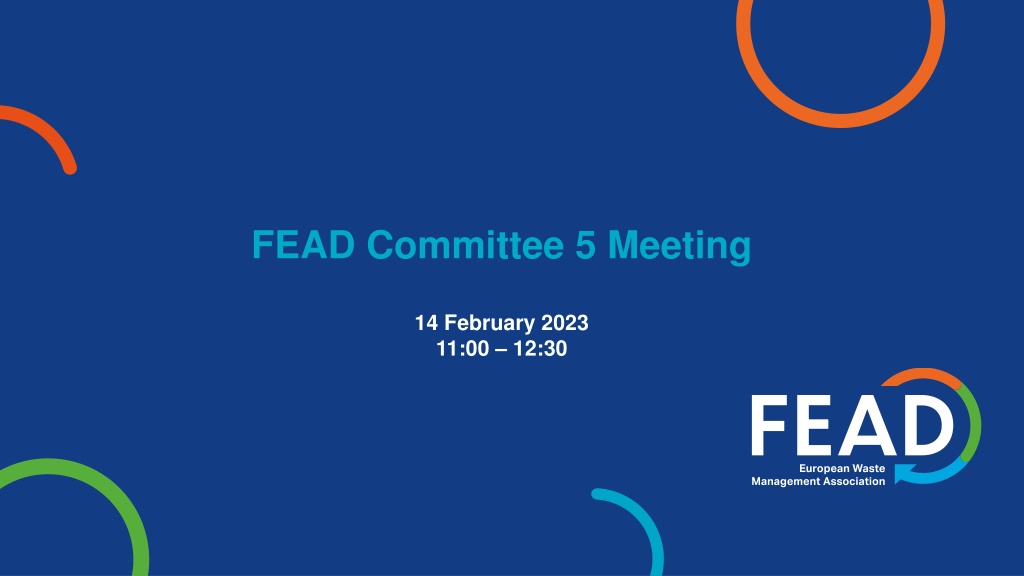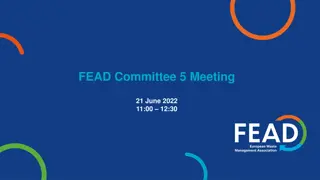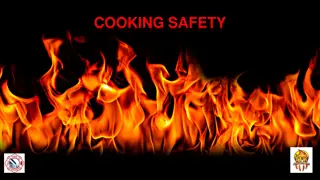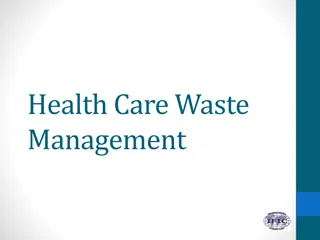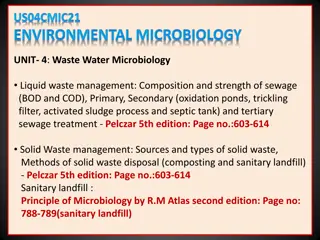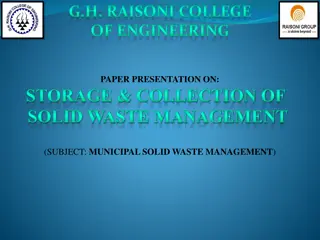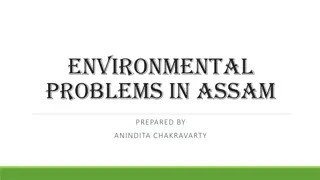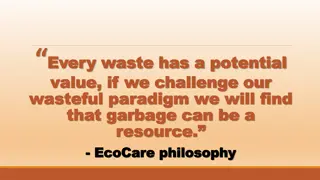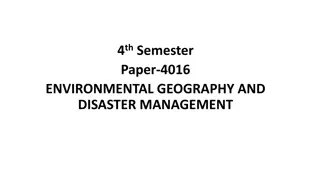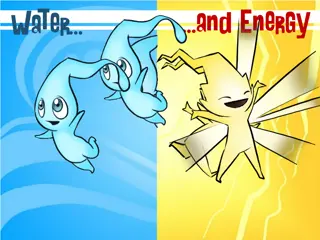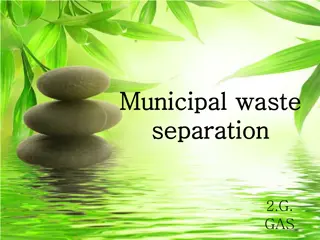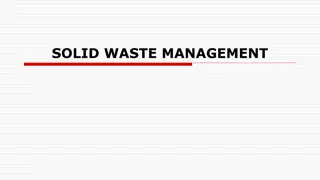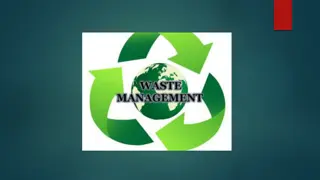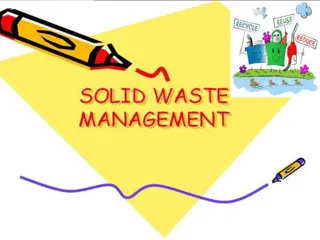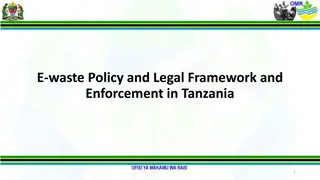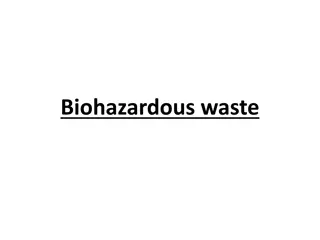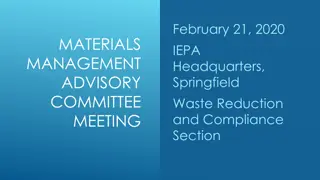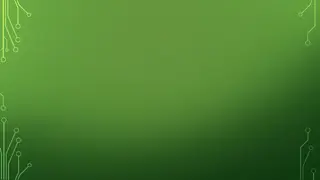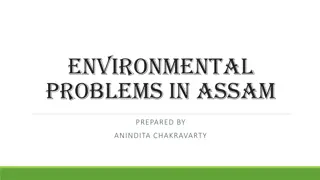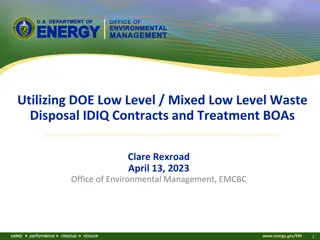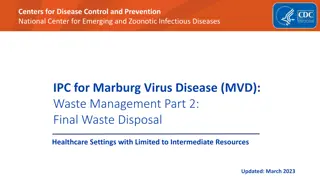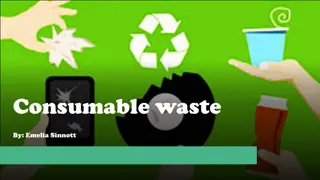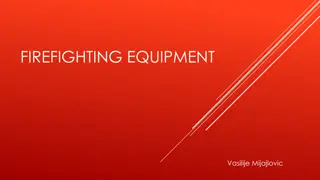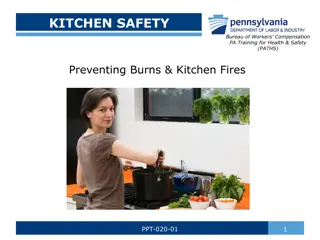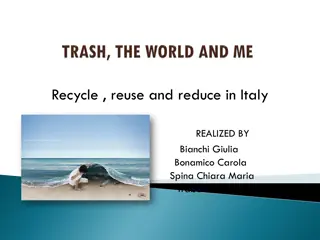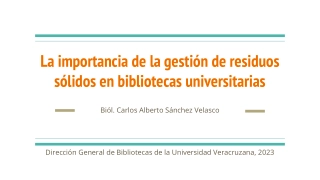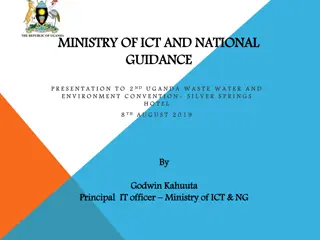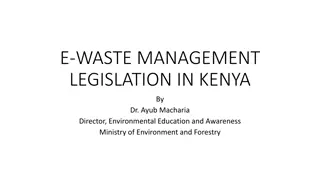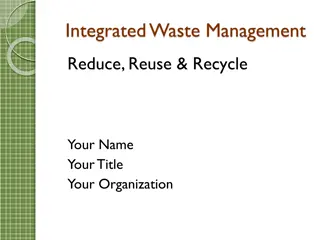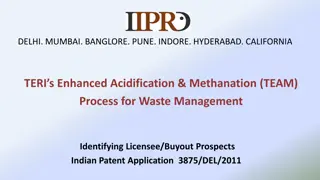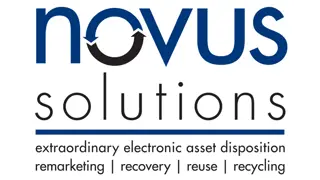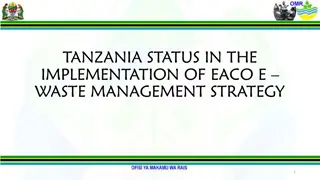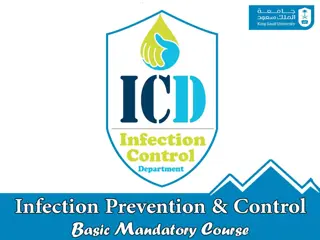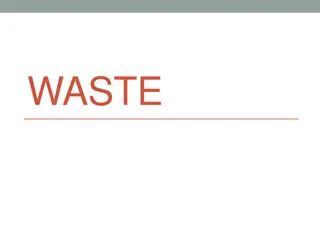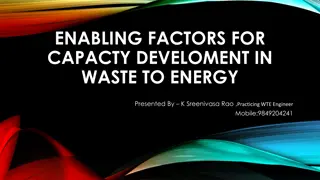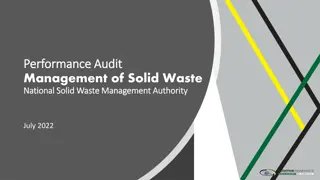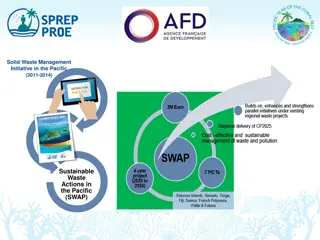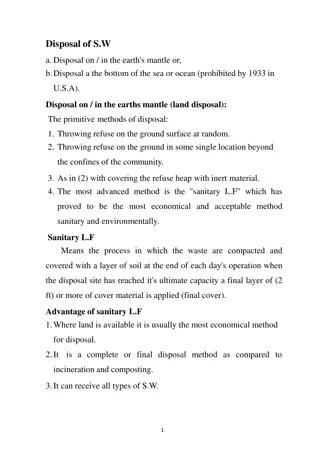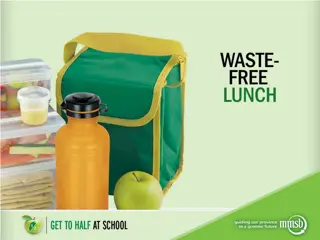FEAD Committee Meeting on Security and Fires in Waste Management Facilities
The FEAD Committee's upcoming meeting on 14th February 2023 will cover various legislative updates and discussions on security and fires in waste management facilities. The agenda includes updates on legislative files, such as the revision of EU legislation on hazard classification and waste shipment regulation, as well as discussions on fires in facilities caused by batteries. The meeting aims to address safety guidelines, risk assessment methods, and insurance policies to mitigate fire incidents. Participants will also share insights on national/regional safety regulations, enforcement of provisions related to batteries, challenges with insurance companies, and potential measures to enhance safety protocols.
Download Presentation

Please find below an Image/Link to download the presentation.
The content on the website is provided AS IS for your information and personal use only. It may not be sold, licensed, or shared on other websites without obtaining consent from the author. Download presentation by click this link. If you encounter any issues during the download, it is possible that the publisher has removed the file from their server.
E N D
Presentation Transcript
FEAD Committee 5 Meeting 14 February 2023 11:00 12:30
Agenda 1. Welcome and adoption of the agenda, adoption of the minutes (4 October 2022), news from FEAD s Secretariat 2. Updates on legislative files: Decision/ Action Security in treatment plants: survey and actions Waste Shipment regulation: updates and amendments Revision of EU legislation on hazard classification, labelling and packaging of chemicals (CLP) IED Revision: amendments Revision of EU List of Waste in 2024 PFAS: ECHA publishes PFAS restriction proposal POPs PFHxS in Annex I WEEE Directive revision non-justified retroactivity ADR transport of asbestos waste in bulk (road) Information FEAD in the EU Platform on Sustainable Finance 2.0 - Taxonomy FEAD reply to the most recent consultations and upcoming consultations FEAD upcoming events 3. Date of the next meeting and any other business
Security and fires in the facilities Fire cases in waste management plants have increased in the last years: Small domestic electronic items and mixed WEEE are far more subject to thermal events than other waste streams; Batteries, and in particular damaged batteries, are identified as the cause of the ignition *(Characterisation of fires caused by batteries in WEEE Survey results from the WEEE management chain 2020) Fires also have indirect financial implications, particularly through increases in the cost of the insurance that many facilities carry (sometimes, even difficulties in obtaining insurance) Possible actions: Internal Survey Extended collection of national best practices: Guidelines and safety rules for waste management plant Risk assessment method and insurance policies Possible development of FEAD guidelines Joint actions with EERA
Security and fires in the facilities Do you have national/regional (fire) safety regulations/guidelines for waste management plants? Are there specific provisions related to batteries? Are they enforceable? How? Which kind of problems are you having with insurance companies? To what extend do the insurances recognise the results of your RA (implemented measures)? To what extend do the insurances recognise existing (fire) safety guidelines/provisions you follow? What other measures/actions do you think could help (DRS batteries, EU EPR for batteries, stronger application of the PPP for batteries, classification of lithium batteries as HW?)
Waste Shipment Regulation (WSR) FEAD HW position EP Plenary vote 17 January 2023 Council GA expected before summer FEAD HW PP + AM The critical size necessary to create and operate the highly specialised and technical plants to treat hazardous waste does not allow for their replication in each MS waste transfers are essential in order to ensure an effective hazardous waste recovery and treatment Burden of proof on the notifier in Art. 11 is not only a huge adm burden but also not realistic (impossible!) for the notifier to know this information Aim to get back to the current system where the CA can raise concerns, allowing a case-by case assessment Clarify that tacit consent also applies to disposal shipments ( written is mentioned in paragraph 1) Clarify that a motivated explanation as foreseen in Art. 9 is also required for Article 11 Art. 11 is very strict: all the following conditions are fulfilled Scope of illegal acts foreseen is extremely broad and should be limited in time to unredeemed offenses, and only cover serious and criminal, legally binding offences, but not minor and administrative ones. The proposed wording by Commission can lead to a situation where an error made by one facility or even one person will impede the whole company (including all its facilities/activity branches) shipping waste forever. Limit in Art. 11(1)(b) and 12(1)(f) Same in relation to non-compliance with Art. 15 and 16 We propose the include repeatedly , which would actually align it with Art. 12 Where there are no national capacities to treat HW, the procedure should be streamlined to ensure that once the CA of destination has authorised the shipments, the CA of dispatch and transit cannot raise objections/not authorise the shipment E.g.: NL. MT, IE, any others? Any further comments/examples?
CLP updates On 19 December 2022, the Commission proposed a revised Regulation on classification, labelling and packaging of chemicals (CLP) and introduced new hazard classes for endocrine disruptors and other harmful chemical substances to better protect people and the environment from hazardous chemicals. More specifically, the Commission published: 1. Proposal for a revision of the Regulation on classification, labelling and packaging of chemicals (CLP), that it is out for consultation until 30 March 2023 The proposal aims to implement several of the priorities of the Chemicals Strategy for Sustainability. The revision seeks to make labelling more consumer friendly, less burdensome for suppliers and easier to enforce by clearly clarifying the rules and exemptions, whilst also improving compliance. The central aims of the proposal are: (i) to ensure that all hazardous chemicals are classified adequately and uniformly throughout the EU; (ii) to improve hazard communication by making labels more accessible and understandable whilst also providing companies with more flexibility to reduce the administrative burden; (iii) to ensure that the rules on chemical hazard classification and communication are applied by all actors in the supply chain and are applied to online sales and imported articles; and (iv) to clarify the legal uncertainty related to the notifications that companies must submit to poison centres for emergency health response. 2. Delegated Regulation amending Regulation 1272/2008 as regards hazard classes and criteria for the classification, labelling and packaging of substances and mixtures FEAD internal consultation within Com.5 and Sub-com. Chemicals: no feedback
IED Revision (1) On 5 April 2022, the Commission adopted proposals for revised EU measures to address pollution from large industrial installations FEAD provided feedback to the Commission adopted proposal in June 2022 Draft report of ENVI Committee published on 14 November 2022 FEAD sent its amendments by 07 December 2022 ENVI amendments On 25 January, the Swedish Presidency published its steering note on the IED proposal, ahead of AGRIFISH meeting (30/01) All delegations in principle accepted that the agricultural sector should contribute to the reduction of emissions but underlined the need for the provisions of the current proposal to be revised in order to address their concerns having in mind the importance of agriculture and food security Participants also made suggestions, altering the provisions of the proposal, which concerned regional differences across the agricultural sector, exempting small and medium sized farms adopting sustainable practices, transition periods, and compensation funds for farmers. Next step: ENVI Committee vote: 25 April 2023 Plenary Deadline for amendments: June 2023 Discussion at the Council: June 2023 Final legislative act: H2 2023
IED Revision (2) FEAD is analysing the amendments and the feedback received. BDE & VOEB Articles Amendments Art. 5(4) - Granting of a permit 427, 428 Art. 9(2) - Emission of greenhouse gases 494-496, 498-499 Art. 13(2) - BAT reference documents and exchange of information 611 Art. 14a - Environmental management system 697, 700 Art. 15(3) - Emission limit values 791 Art. 15(3a) - Environmental performance limit values 821, 823, 824, 828, 829 Art. 27d Transformation plan 1070, 1073, 1077, 1081, 1085, 1086, 1088, 1123, 1124, 1125, 1154, 1157, 1158, 1170, 1175, 1176 Art. 79 Penalties 1490 Art. 79a - Compensation 1534, 1535
IED Revision (3) FEAD is analysing the amendments and the feedback received. FNADE Article Amendment Article Amendment Art. 1 263 Art. 14 671, 672, 673, 674, 675, 677, 678, 760 Art. 3 292, 293, 294, 295, 380, 386, 401, 410, 676 Art. 15 780, 782, 785, 795, 800, 804, 811, 812, 813, 814, 815, 816, 819, 831, 834, 841, 843, 851, 852, 853, 854, 855, 856, 857, 868, 871, 874, 875, 887, 888, 889 Art. 5 419, 422, 424, 426 Art. 16(2) 917 Art. 7(1a) 466 Art. 17(2-3) 924, 925, 926, 927, 928, 929 Art. 8 - 473, 488 Art. 18(1) 932, 933, 934, 935 Art. 9(1) 490 Art. 21 953, 954, 971, 972, 973 Art. 11(1c) 514 Art. 22 974, 975, 976, 977 Art. 12(1) 550, 560, 561, 562 Art. 24 1007, 1009, 1014 Art. 13 579, 580, 583, 584, 586, 587, 596, 623, 632, 634, 636 Art. 27d 1091, 1092, 1095, 1121, 1150, 1151, 1159, 1161
IED Revision (4) FEAD is analysing the amendments and the feedback received. FNADE Article Amendment Art. 44(1d) 1207, 1208, 1209, 1210 Art. 50(2a) 1212, 1213, 1214 Art. 79 1496, 1498, 1505, 1531 Art. 79a 1555, 1556, 1557, 1559, 1560, 1561, 1562, 1563, 1564, 1565, 1568, 1569 Annex I 1589, 1590 Annex II 1702, 1703, 1707, 1708, 1709, 1710, 1711, 1712, 1713, 1718, 1720, 1721, 1722, 1724 Annex VI 1749, 1750
IED Revision (5) Amendments of concern, spotted by CEWEP: Kanev sdraft report: AM 102 (Article 45): limits for olfactory pollution AM 1207-1208-1209-1210: mandatory waste sorting before incineration AM 1212-1213-1214-1750: requirements on dioxins already mandatory from the BREF (BAT4 + BAT5) AM 1216-1217-1218 on gross emission data only for WI
Revision of EU List of Waste in 2024 The Commission intends to propose the update of the EU List of Waste in 2024. On 03 October 2022, the Commissioner Mr. Sinkevi ius, answering to the question of MEP Eugen Jurzyca (ECR/Slovakia), stated that the Commission is aware of the need to update the EU List of Waste, to include waste lithium-ion industrial and electric vehicle batteries as separate waste codes, including as appropriate as hazardous waste, under sub-Chapter 16.06 in order to harmonise the current disparate classification across Member States. The Commission intends to propose such an update together with other targeted changes to the EU List of Waste in 2024. Comments? Is there a need to update anything else in the list?
PFAS: ECHA publishes PFAS restriction proposal On 7 February 2023, a proposal for a European ban on PFAS has been published by ECHA after proposal by The Netherlands, Denmark, Germany, Norway and Sweden The proposal focuses on the entire group of PFAS substances in order to avoid one PFAS being replaced by another See report here Stages in the process of banning the use of PFAS. Submit a restriction proposal - completed Public consultation - March 2023 Opinion from ECHA Scientific Committees (RAC and SEAC) - 2024 European Commission proposal - 2025
PFAS: ECHA publishes PFAS restriction proposal 2 options Restriction conditions Ban on manufacture, placing on the market and use PFASs as such, as constituent in other substances or in mixtures and articles Above a set concentration limit Transition period of 18 months (especially for consumer-use applications) 5 years where alternatives are under development (food contact materials for production) 12 years where identification, development and certification of alternatives needed (implantable medical devices) Use-specific (time-limited) derogations Next steps: Full ban with immediate effect Ban with use-specific derogations Any comments?
POPs - PFHxS Proposal to include perfluorohexane sulfonic acid (PFHxS), its salts and PFHxS-related compounds as substances that are subject to certain restrictions in Annex I to the POPs Regulation. 0,025 mg/kg for PFHxS including its salts 1 mg/kg for the individual PFHxS-related compounds or a combination of those compounds For the use in firefighting foams where those limit values cannot currently be met, they propose higher concentration limits, subject to review by the Commission within 3 years. At the COP 10 to the Stockholm Convention in June 2022, it was decided to include perfluorohexane sulfonic acid (PFHxS), its salts and PFHxS-related compounds in Annex A to the Convention. Annex IV (Concentration limit referred to in Article 7(4)(a)) Perfluorohexane sulfonic acid (PFHxS), its salts and PFHxS-related compounds 1 mg/kg (PFHxS and its salts) 40 mg/kg (sum of PFHxS-related compounds) Annex V (Maximum concentration limits for wastes and operations to which Article 7(4)(b) applies) Perfluorooctanoic acid (PFOA), its salts and PFOA-related compounds 50 mg/kg (PFHxS and its salts) 2 000 mg/kg (PFHxS-related compounds) Feedback period until 9 March 2023 Comments? Any implication for FEAD s members?
WEEE non-justified retroactivity Com proposal On 7 February 2023, Commission published proposal to amend Article 12, paragraphs 1, 3 and 4, Article 13(1) and Article 15(2) of the WEEE Directive as a follow-up to the judgement of the CJEU (C-181/20) to clarify the time when the financing obligation for producers apply and Article 14(4) and Article 15(2) in order to update the reference to the European standard EN 50419 (marking of EEE): replace the reference to the 2006 version of this standard with the 2022 version. On 25 January 2022, the CJEU declared as partially invalid Article 13(1) of the WEEE Directive (C-181/20) Article 13(1) establishes that producers of EEE are to bear the costs for the collection, treatment, recovery and environmentally sound disposal of WEEE from users other than private households resulting from products placed on the market after 13 August 2005. Photovoltaic panels were included in the scope of the WEEE Directive from 13 August 2012 (Directive 2012/19/EU). Non-justified retroactive effect, insofar as it provides for producers to have to assume the financing of the costs of collection, treatment, recovery and environmentally sound disposal of waste from photovoltaic panels placed on the market between 13 August 2005 and 13 August 2012. Article 12(1) also amended as it contained a parallel provision for EEE for private households. It was not explicitly targeted by the Court s judgement, but it was assessed that it can likewise be regarded as retroactive in the light of the Court s reasoning. Same clarification for openscope set out in Article 2(1)(b) of the WEEE Directive as of 15 August 2018 (private households and EEE for users other than private households) from 15 August 2018, subject to paragraphs 3 and 4, to all EEE. All EEE shall be classified within the categories set out in Annex III. Annex IV contains a non-exhaustive list of EEE which falls within the categories set out in Annex III (open scope). Clarification that producers are obliged only from 15 August 2018 to finance the management of waste from openscope EEE. Likewise, correction of Article 15(2) on marking of EEE: For photovoltaic panels mandatory for those placed on the market after 13 August 2012 For openscope WEEE, placed on the market after 15 August 2018 .
WEEE non-justified retroactivity Com proposal Financing obligation for producers apply (from private households & other users): for WEEE resulting from EEE referred to in Article 2(1)(a) (transitional period scope) other than photovoltaic panels: placed on the market after 13 August 2005; for WEEE resulting from photovoltaic panels: placed on the market after 13 August 2012; and for openscope WEEE (Article 2(1)(b) and which does not fall under 2(1)(a)): placed on the market from 15 August 2018. Exclude photovoltaic panels and openscope WEEE from historicalwaste provision (Art. 12(4)): financing be borne by one or more systems to which all producers existing on the market when the respective costs occur contribute proportionately (only applicable to WEEE from private households) Financing before the dates above For household WEEE Historicalwaste , according to Art. 12(4) The rest: municipality? For WEEE from other users (Art. 13(1)) Historicalwaste , when replaced by new equipment, by producer (MS may deviate from this and put burden on users) The rest, by the user. Should be transposed by MS at the latest one year after the entry into force. COM proposal open for feedback until 4 April Any impact for FEAD? Do you want to submit feedback?
ADR - transport of asbestos waste in bulk (road) SP 168 dedicated to asbestos Asbestos which is immersed or fixed in a natural or artificial binder (such as cement, plastics, asphalt, resins or mineral ore) in such a way that no escape of hazardous quantities of respirable asbestos fibres can occur during carriage is not subject to the requirements of ADR. Manufactured articles containing asbestos and not meeting this provision are nevertheless not subject to the requirements of ADR when packed so that no escape of hazardous quantities of respirable asbestos fibres can occur during carriage. Is asbestos waste covered? Different national interpretations (from all covered to extremely strict) IWG lead by FEAD met on 16 November to discuss a proposal to regulate transport of asbestos waste in bulk in the ADR. The new rule should allow each country to continue SP 168 according to its own interpretation but facilitate the situation in countries with a very strict interpretation of the scope of SP 168. Do you have any issues in relation to this at national level? What is the interpretation of SP 168 in your country?
FEAD in the EU Platform on Sustainable Finance 2.0 - Taxonomy List of 28 experts to join the new EU Platform on Sustainable Finance published on 8 February 2023. FEAD, EuRIC and PRE jointly selected within the European Alliance for Sustainable Finance in waste management & recycling (EASF). See PR here. See all Members and Observers here. 2 years mandate from Q1 2023 to Q4 2024. Chair: Ms Helena Vi es Fiestas, Commissioner of the Spanish Financial Markets Authority (see cv). The Platform 2.0 will focus on the following priorities with 3 dedicated subgroups (see organigramme here): (i) support the European Commission in its work on improving the usability of the EU sustainable finance framework (including the EU Taxonomy) for market participants; (ii) support the European Commission with advising on further development of the EU Taxonomy activities and associated technical screening criteria across all six environmental objectives; and (iii) support the European Commission with advice and analysis on the implementation of parts of the Strategy, in particular monitoring of capital flows into sustainable investments. The Platform 2.0 is expected to deliver recommendations on TSC for additional economic activities not covered in the March 2022 report on technical screening criteria for, in particular, the four remaining environmental objectives (include the transition to a circular economy and pollution prevention and control) TSC for new economic activities that address all six climate and environmental objectives Revise existing TSC March 2022 report covered waste management in chapter 11, including the following points on HW: Collection and transport of non-hazardous and hazardous waste as a means for material recovery Collection and transport of hazardous waste Treatment of hazardous waste Depollution and dismantling of end-of-life products Any comments? Task Force to work (4/5 people) - names & emails by Feb. 27th the very latest
FEAD upcoming Events 01 March, Bruxelles: Parliamentary Dinner Other issues? ANY FURTHER QUESTIONS?
